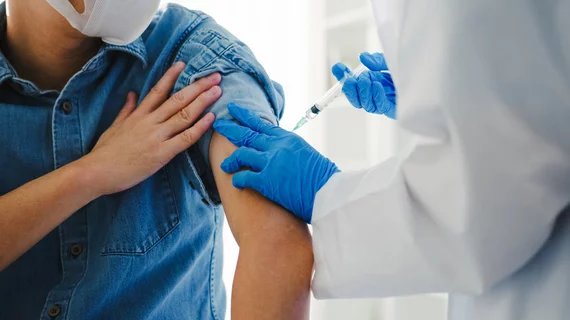Heart inflammation remains 2 months later in some patients with COVID-19 vaccine-related myocarditis
Acute myocarditis has been identified as a potentially harmful side effect of receiving a COVID-19 vaccine. It is rare enough, however, that cardiologists and cardiology societies still largely agree that the benefits associated with vaccination far outweigh the risks.
Hoping to learn more about the long-term impact vaccination may have on a patient’s heart, a team of cardiologists and radiologists with the University of Toronto used FDG PET/MRI to evaluate patients with and without vaccine-related myocarditis. The group shared its findings in Radiology: Cardiothoracic Imaging.[1]
“We know that some patients are at risk of myocarditis following mRNA-based COVID-19,” senior author Kate Hanneman, MD, an associate professor of cardiothoracic imaging at the University of Toronto, said in a prepared statement. “However, there are limited data on potential myocardial tissue changes in patients who are asymptomatic after COVID-19 vaccination. Similarly, we have very limited data to date on patients who present with new symptoms after vaccination but do not meet diagnostic criteria for acute myocarditis.”
Hanneman et al. explored data from 54 patients who underwent FDG PET/MRI a median of 72 days following COVID-19 vaccination. Seventeen of those patients had developed cardiac symptoms following vaccination and had myocarditis. Another 17 patients developed cardiac symptoms, but did not have myocarditis. The remaining 20 patients, meanwhile, were completely asymptomatic—they presented with no active cardiac symptoms and no myocarditis.
Overall, signs of heart inflammation were seen in a total of two patients—and both of those patients were among the 17 who had myocarditis. This means that no asymptomatic or symptomatic patients without myocarditis showed any signs of heart inflammation on medical imaging two months following vaccination.
“This suggests that symptoms alone are a poor indicator of myocardial injury after vaccination,” Hanneman said in the same statement.
Another key takeaway from this study was that subclinical myocardial injury was quite rare among patients who had been vaccinated. The group did note that more research is still needed to continue to help clinicians learn more about this topic.
The full study is available here.

